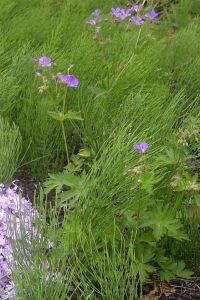How do I rid my garden of horsetail?
Question:
 Our garden in Harpswell on Casco Bay has been overrun with Marestails (Horse Tails.) We have been told that there is no way to kill it other than to dig our the entire garden, and replace the soil.
Our garden in Harpswell on Casco Bay has been overrun with Marestails (Horse Tails.) We have been told that there is no way to kill it other than to dig our the entire garden, and replace the soil.
Recently we came across an article that says since they grew up (millions of years ago) in acid volcanic soil, sweetening the soil with a heavy dose of lime followed by fertilizer “should clear them up in 2 – 5 years.” This pre-supposed removing all mulch which we have been applying since 2014 when the garden was first tilled. The article was published in Gardens West magazine, April 2004, and is copyrighted by Swansons Nursery and Garden Center, 9701 15th Avenue NW, Seattle, WA 98117, 206.782.2543.
The plants are spreading to other parts of the garden as well, but one section is completely inundated. The hillside garden gets full sun several hours a day.
Do you know of any treatment that could ride these beasts (I call them COVID plants) from our garden?
Answer:
Rebecca Long, Agriculture and Food System Professional
Horsetail is a tough one! Adjusting pH alone is unlikely to be a solution, while horsetail may prefer acidic conditions, it can grow in a range of conditions so if you raised the pH high enough to be totally inhospitable for horsetail, it would likely be unsuitable for most plants. Here are some approaches you could take, unfortunately, none of them are quick or easy.
1. Test the soil and adjust pH and fertility as recommended. While this alone is unlikely to be enough, this step will help ensure that the site is suitable for the plants you want and help them out compete weeds.
2. Horsetail likes wet conditions so if you can, improve drainage or adjust your irrigation practices to focus on just watering desirable plants (soaker hose or a drip irrigation system could help).
3. Avoid tillage, since horsetail spreads by rhizome.
4. Employ a strategy to exhaust the plants energy reserves: One option is repeated pulling/mowing/hand cutting of the stalks as they appear. This would need to be done multiple times per year, perhaps 5 -6 times. Don’t compost plant parts. The other option would be to shade out the plants with cardboard, a tarp, ground cloth, or by densely planting large plants. This may take several years, vigilance, and trying several of these approaches together.
Herbicide options have limited effectiveness and application is difficult around desirable plants. Here is more information, Home, Yard & Garden Pest. Let me know if you have any questions about that and good luck!
